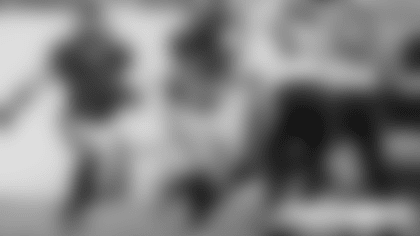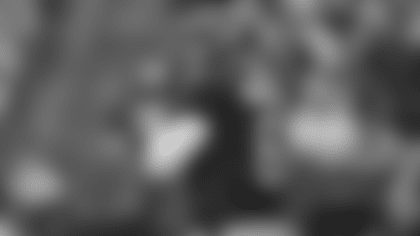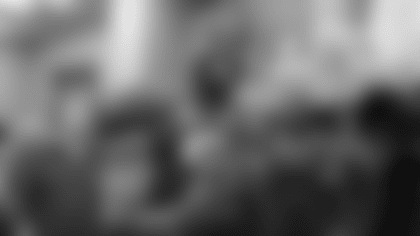For an NFL special teams coach, change comes swiftly and annually. Even teams that have long-tenured specialists in place will have plenty of new players in their kick and coverage units in each training camp thanks to the inevitable roster turnover from year to year.
For the Tampa Bay Buccaneers, the changes started at the top in 2024, with Keith Armstrong electing to retire after 30 seasons in the NFL, the last five as the Buccaneers' special teams coordinator. He was replaced by Thomas "T-Mac" McGaughey, who has held that same title for four other NFL teams, most recently the New York Giants from 2018-23.
McGaughey has had a couple months to teach and evaluate his new charges, but the work starts in earnest next week when the players report for training camp. Here's a look at what he will be working with, and working on, in the various areas of special teams, when practices begin next Wednesday.
Kickoff Return/Coverage
This is the big one, thanks to the sweeping alterations the NFL made to the kickoff process for 2024 (and possibly beyond if it goes well). To summarize, teams can put one or two return men back in the "landing zone," which is the goal line to the 20, with the other nine blockers lined up between the 30 and 35-yard lines of the receiving team. The kicker will still kick off from his own 35-yard line, but the other 10 cover men must line up at the receiving team's 40. Those 19 players spaced roughly five yards a part can move towards each other until the ball hits the ground or is caught by the return man. If the ball lands (or is caught) in the landing zone, it must be returned. A touchback now brings the ball out to the 30, unless it hits the ground in the landing zone and then goes into the end zone, in which case it comes out to the 20. A ball that hits the ground before the landing zone is also considered a touchback but the ball comes all the way out to the 40.
Multiple special teams coaches around the league, including McGaughey, have noted that the altered set-up makes the kickoff return more like an offensive play, with a line of scrimmage. This and the drastically reduced amount of field the cover men have to transverse makes it possible that different types of players will be on the return and coverage units, perhaps tending towards bigger men. McGaughey is just as uncertain how it is all going to play out until the games begin, but he definitely approves of the change.
"It's not a ceremonial play anymore," he said. "I think it's something that can really affect the game in a positive way. I think it's one of those deals where people are going to be surprised about how impactul of a play it is. I think it's going to be big, I really do."
McGaughey also knows there could be significant imbalances in how well some teams adjust to the new process, at least in the early going, possibly creating big advantages for the quicker-learning squads.
"That's why they call us 'Coach,'" he said. "We're paid to make adjustments and do those types of things. I think whoever figures it out the quickest and whoever is able to make the adjustments the quickest are going to have the most success.
"Right now everything's up in the air. You just never know. It will be fun to see how it all grows and takes off. It will be interesting to see the matchups, it will be interesting to see the end-game matchups, the adjustments you're going to have to make because all kinds of things can happen out there. So it will be fun."
McGaughey noted that the new rules will essentially be adding 10 or so plays to a game, if teams do prioriize putting kicks into the landing zone over taking touchbacks. That adds value to core special teamers and could affect how regular season roster are constructed.
"Now you could have, potentially, 10 more plays a game," said the coach. "So now you've got to build your roster a little bit different, have some of those core guys [on offense and defense involved]…those 10 plays are real plays now. I think you'll maximize the roster from the top down and the bottom up when it comes to this play."
As for training camp, McGaughey expects that the new rules will require teams to spend more time on kickoff return and coverage in practice than they would have previously. If camp is anything like the OTAs and minicamp practices from May and June, the Buccaneers are going to be looking at a lot of different candidates to bring the ball out on kickoff returns. Last season, second-year wideout Deven Thompkins handled 100% of the Bucs' kickoff and punt returns, but Thompkins was waived in May and the team might have wanted a different type of return man on kickoffs anyway. McGaughey did mention that rookie running back Bucky Irving would be in the mix at kickoff return. At the very least, the Bucs will need more than one option at returner because they are probably going to line up two of them in the landing zone rather than just one.
Punter Jake Camarda, who is proficient at producing touchbacks, handled the kickoff duties for the past two years and may still have that assignment in 2024, particularly if the coaches eventually decide that 30-yard-line touchbacks are worth eliminating the risk of multiple return touchdowns. However, if the emphasis is on accuracy and placement – and given that hang time on kicks is now essentially relevant since the cover men aren't racing down the field – the kickoff job could go to whomever is better at putting the ball where they want it in the landing zone.
Punting
Jake Camarda, a fifth-round pick from 2023 with a huge leg, has wasted no time in putting his name in the Bucs' record books. His 48.8-yard gross punting average as a rookie was a new single-season team record, but it only lasted one year as he topped that with a 50.1-yard mark last year, which ranked fifth in the NFL. He blasted nine punts of over 60 yards, including a 74-yarder that tied the Bucs' all-time record. However, he did struggle a bit in the last month or so of the season with a number of mis-hit balls.
Camarda is obviously still young and is still harnessing his talents. McGaughey wants to help him "find his process" so that he can be a more consistent punter overall.
"When you say 'weapon,' a guy that can flip the field like that, obviously to have a guy like that is huge," said McGaughey. "But there's a lot of things Jake needs to work on as far as consistency and just being able to grow his game and further his game. He has a lot of raw talent and he just needs to refine it just a little bit more. That's the maturation process of a young punter with a big leg in this league."
View photos of the Tampa Bay Buccaneers taking part in Day 3 of Mandatory Minicamp at AdventHealth Training Center on June 13th, 2024.

TAMPA, FL - June 13, 2024 - Helmet during 2024 Minicamp at AdventHealth Training Center. Photo By Kyle Zedaker/Tampa Bay Buccaneers

TAMPA, FL - June 13, 2024 - Outside Linebacker Jose Ramirez #33 of the Tampa Bay Buccaneers during 2024 Minicamp at AdventHealth Training Center. Photo By Kyle Zedaker/Tampa Bay Buccaneers

TAMPA, FL - June 13, 2024 - Head Coach Todd Bowles of the Tampa Bay Buccaneers during 2024 Minicamp at AdventHealth Training Center. Photo By Kyle Zedaker/Tampa Bay Buccaneers

TAMPA, FL - June 13, 2024 - Safety Antoine Winfield Jr. #31 of the Tampa Bay Buccaneers during 2024 Minicamp at AdventHealth Training Center. Photo By Kyle Zedaker/Tampa Bay Buccaneers

TAMPA, FL - June 13, 2024 - Offensive Coordinator Liam Coen of the Tampa Bay Buccaneers during 2024 Minicamp at AdventHealth Training Center. Photo By Kyle Zedaker/Tampa Bay Buccaneers

TAMPA, FL - June 13, 2024 - Wide Receiver Mike Evans #13 of the Tampa Bay Buccaneers during 2024 Minicamp at AdventHealth Training Center. Photo By Kyle Zedaker/Tampa Bay Buccaneers

TAMPA, FL - June 13, 2024 - Head Coach Todd Bowles of the Tampa Bay Buccaneers during 2024 Minicamp at AdventHealth Training Center. Photo By Kyle Zedaker/Tampa Bay Buccaneers

TAMPA, FL - June 13, 2024 - Tight End Payne Durham #87 of the Tampa Bay Buccaneers during 2024 Minicamp at AdventHealth Training Center. Photo By Kyle Zedaker/Tampa Bay Buccaneers

TAMPA, FL - June 13, 2024 - Defensive Tackle Vita Vea #50 of the Tampa Bay Buccaneers during 2024 Minicamp at AdventHealth Training Center. Photo By Kyle Zedaker/Tampa Bay Buccaneers

TAMPA, FL - June 13, 2024 - Quarterback John Wolford #11 of the Tampa Bay Buccaneers during 2024 Minicamp at AdventHealth Training Center. Photo By Kyle Zedaker/Tampa Bay Buccaneers

TAMPA, FL - June 13, 2024 - Safety Jordan Whitehead #3 of the Tampa Bay Buccaneers during 2024 Minicamp at AdventHealth Training Center. Photo By Kyle Zedaker/Tampa Bay Buccaneers
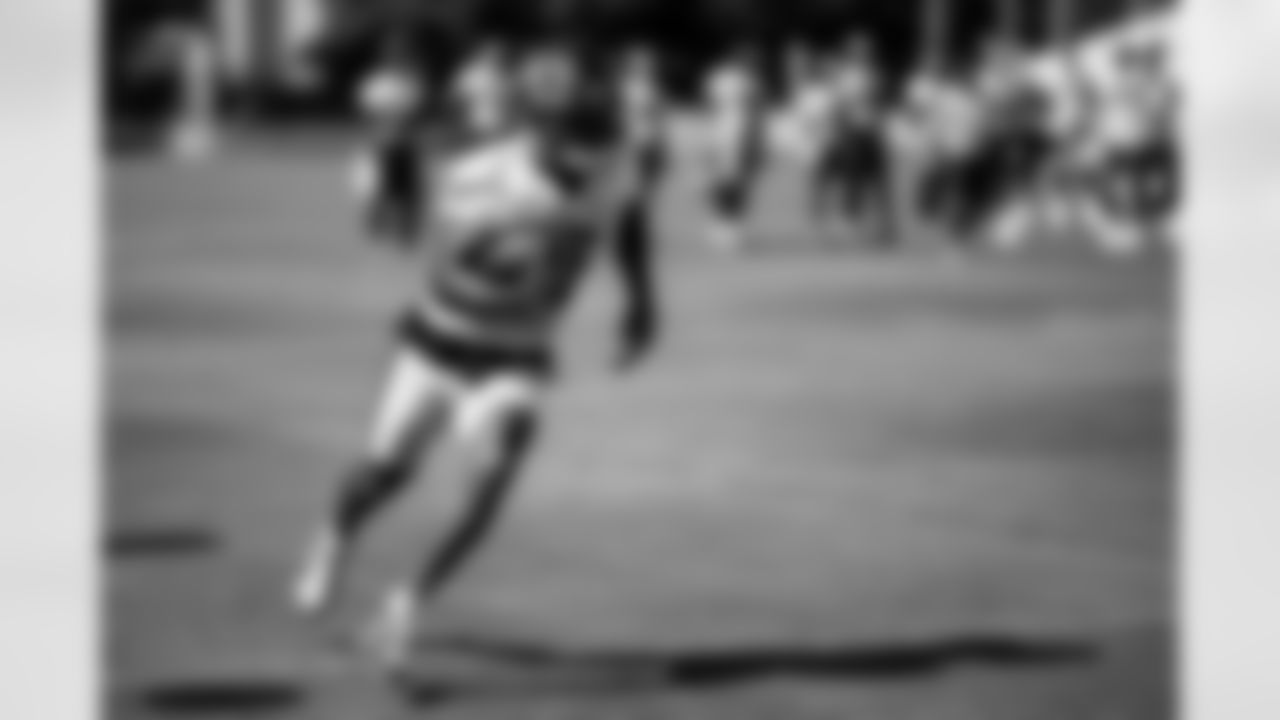
TAMPA, FL - June 13, 2024 - Wide Receiver Sterling Shepard #25 of the Tampa Bay Buccaneers during 2024 Minicamp at AdventHealth Training Center. Photo By Kyle Zedaker/Tampa Bay Buccaneers

TAMPA, FL - June 13, 2024 - Running Back Rachaad White #1 of the Tampa Bay Buccaneers during 2024 Minicamp at AdventHealth Training Center. Photo By Kyle Zedaker/Tampa Bay Buccaneers

TAMPA, FL - June 13, 2024 - Quarterback Baker Mayfield #6 of the Tampa Bay Buccaneers during 2024 Minicamp at AdventHealth Training Center. Photo By Kyle Zedaker/Tampa Bay Buccaneers
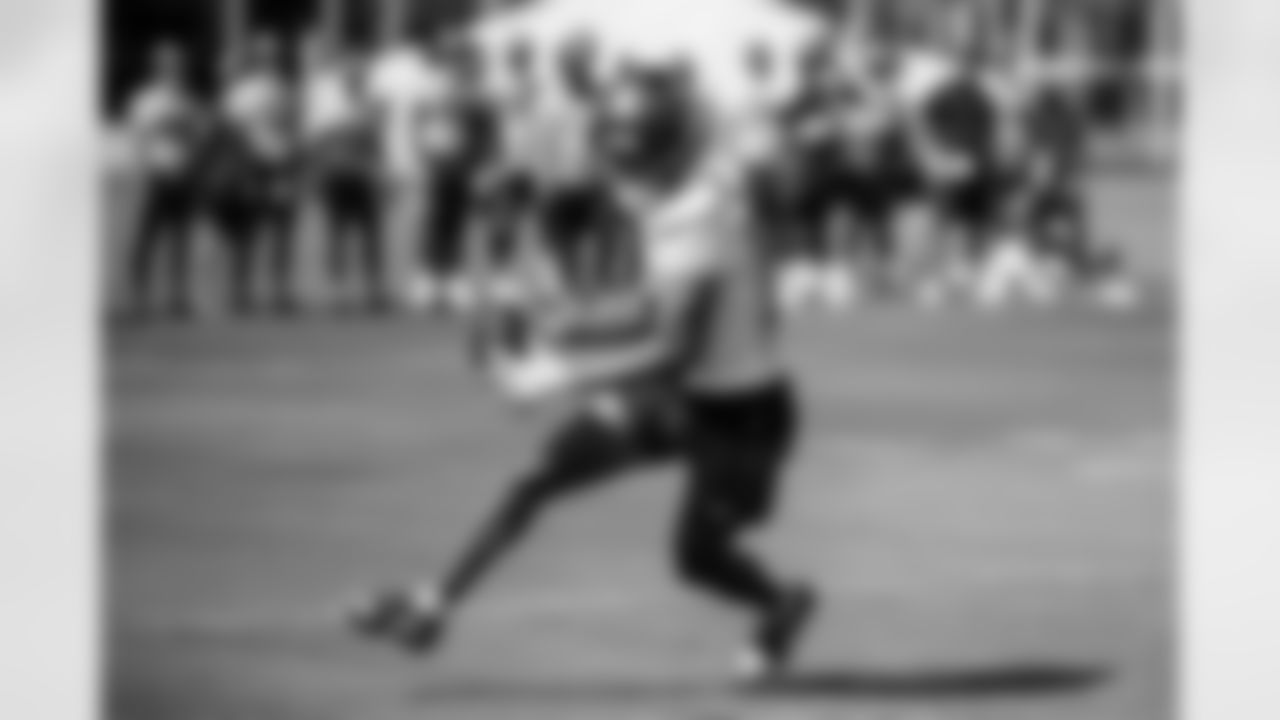
TAMPA, FL - June 13, 2024 - Wide Receiver Jalen McMillan #15 of the Tampa Bay Buccaneers during 2024 Minicamp at AdventHealth Training Center. Photo By Kyle Zedaker/Tampa Bay Buccaneers

TAMPA, FL - June 13, 2024 - Running Back Bucky Irving #7 of the Tampa Bay Buccaneers during 2024 Minicamp at AdventHealth Training Center. Photo By Kyle Zedaker/Tampa Bay Buccaneers

TAMPA, FL - June 13, 2024 - Running Back Rachaad White #1 of the Tampa Bay Buccaneers during 2024 Minicamp at AdventHealth Training Center. Photo By Kyle Zedaker/Tampa Bay Buccaneers

TAMPA, FL - June 13, 2024 - Wide Receiver Sterling Shepard #25 of the Tampa Bay Buccaneers during 2024 Minicamp at AdventHealth Training Center. Photo By Kyle Zedaker/Tampa Bay Buccaneers

TAMPA, FL - June 13, 2024 - Wide Receiver Chris Godwin #14 of the Tampa Bay Buccaneers during 2024 Minicamp at AdventHealth Training Center. Photo By Kyle Zedaker/Tampa Bay Buccaneers

TAMPA, FL - June 13, 2024 - Wide Receiver Latreal Jones #85 of the Tampa Bay Buccaneers during 2024 Minicamp at AdventHealth Training Center. Photo By Kyle Zedaker/Tampa Bay Buccaneers

TAMPA, FL - June 13, 2024 - Wide Receiver Chris Godwin #14 of the Tampa Bay Buccaneers during 2024 Minicamp at AdventHealth Training Center. Photo By Kyle Zedaker/Tampa Bay Buccaneers

TAMPA, FL - June 13, 2024 - Wide Receiver Sterling Shepard #25 of the Tampa Bay Buccaneers during 2024 Minicamp at AdventHealth Training Center. Photo By Kyle Zedaker/Tampa Bay Buccaneers

TAMPA, FL - June 13, 2024 - Wide Receiver Sterling Shepard #25 of the Tampa Bay Buccaneers during 2024 Minicamp at AdventHealth Training Center. Photo By Kyle Zedaker/Tampa Bay Buccaneers

TAMPA, FL - June 13, 2024 - Wide Receiver Chris Godwin #14 of the Tampa Bay Buccaneers during 2024 Minicamp at AdventHealth Training Center. Photo By Kyle Zedaker/Tampa Bay Buccaneers

TAMPA, FL - June 13, 2024 - Outside Linebacker Joe Tryon-Shoyinka #9 of the Tampa Bay Buccaneers during 2024 Minicamp at AdventHealth Training Center. Photo By Kyle Zedaker/Tampa Bay Buccaneers

TAMPA, FL - June 13, 2024 - Wide Receiver Jalen McMillan #15 of the Tampa Bay Buccaneers during 2024 Minicamp at AdventHealth Training Center. Photo By Kyle Zedaker/Tampa Bay Buccaneers

TAMPA, FL - June 13, 2024 - Inside Linebacker K.J. Britt #52 of the Tampa Bay Buccaneers during 2024 Minicamp at AdventHealth Training Center. Photo By Kyle Zedaker/Tampa Bay Buccaneers

TAMPA, FL - June 13, 2024 - Inside Linebacker Lavonte David #54 of the Tampa Bay Buccaneers during 2024 Minicamp at AdventHealth Training Center. Photo By Kyle Zedaker/Tampa Bay Buccaneers

TAMPA, FL - June 13, 2024 - Inside Linebacker SirVocea Dennis #8 of the Tampa Bay Buccaneers during 2024 Minicamp at AdventHealth Training Center. Photo By Kyle Zedaker/Tampa Bay Buccaneers

TAMPA, FL - June 13, 2024 - Inside Linebacker K.J. Britt #52 of the Tampa Bay Buccaneers during 2024 Minicamp at AdventHealth Training Center. Photo By Kyle Zedaker/Tampa Bay Buccaneers

TAMPA, FL - June 13, 2024 - Outside Linebacker Yaya Diaby #0 of the Tampa Bay Buccaneers during 2024 Minicamp at AdventHealth Training Center. Photo By Kyle Zedaker/Tampa Bay Buccaneers

TAMPA, FL - June 13, 2024 - Inside Linebacker Lavonte David #54 of the Tampa Bay Buccaneers during 2024 Minicamp at AdventHealth Training Center. Photo By Kyle Zedaker/Tampa Bay Buccaneers

TAMPA, FL - June 13, 2024 - Outside Linebacker Yaya Diaby #0 of the Tampa Bay Buccaneers during 2024 Minicamp at AdventHealth Training Center. Photo By Kyle Zedaker/Tampa Bay Buccaneers
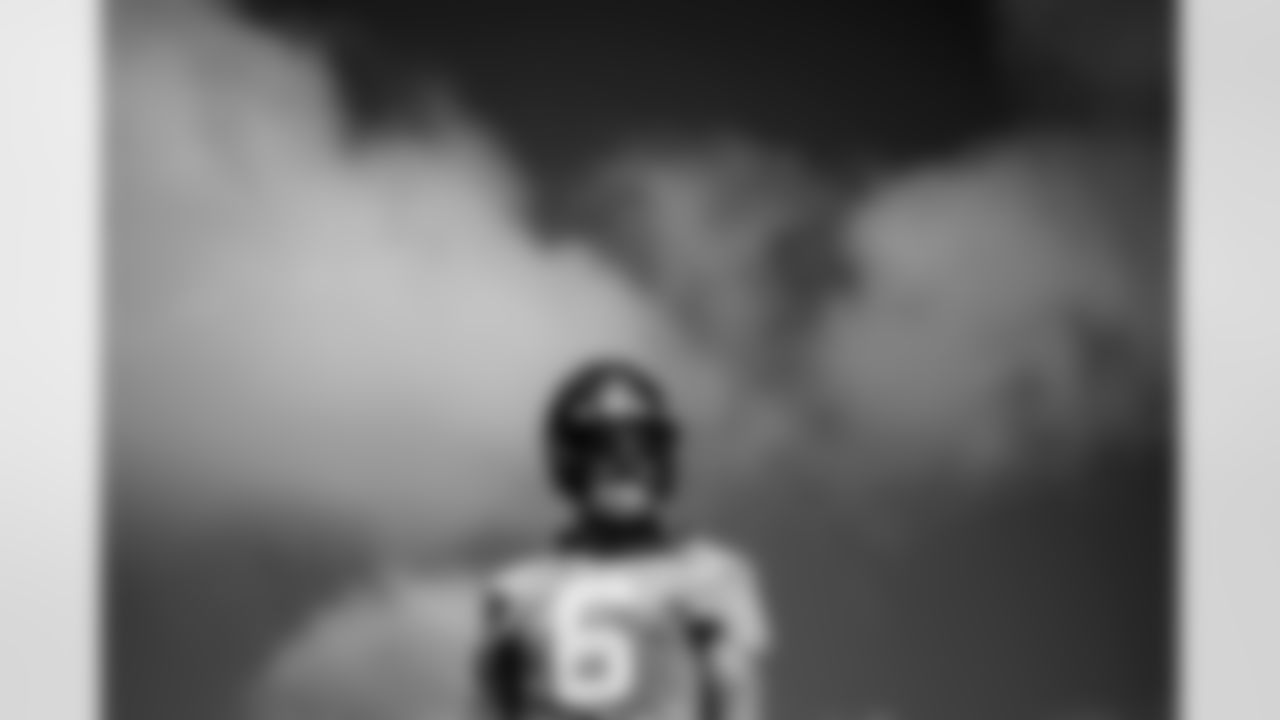
TAMPA, FL - June 13, 2024 - Quarterback Baker Mayfield #6 of the Tampa Bay Buccaneers during 2024 Minicamp at AdventHealth Training Center. Photo By Kyle Zedaker/Tampa Bay Buccaneers

TAMPA, FL - June 13, 2024 - Center Graham Barton #62 of the Tampa Bay Buccaneers during 2024 Minicamp at AdventHealth Training Center. Photo By Kyle Zedaker/Tampa Bay Buccaneers

TAMPA, FL - June 13, 2024 - Quarterback Baker Mayfield #6 of the Tampa Bay Buccaneers during 2024 Minicamp at AdventHealth Training Center. Photo By Kyle Zedaker/Tampa Bay Buccaneers
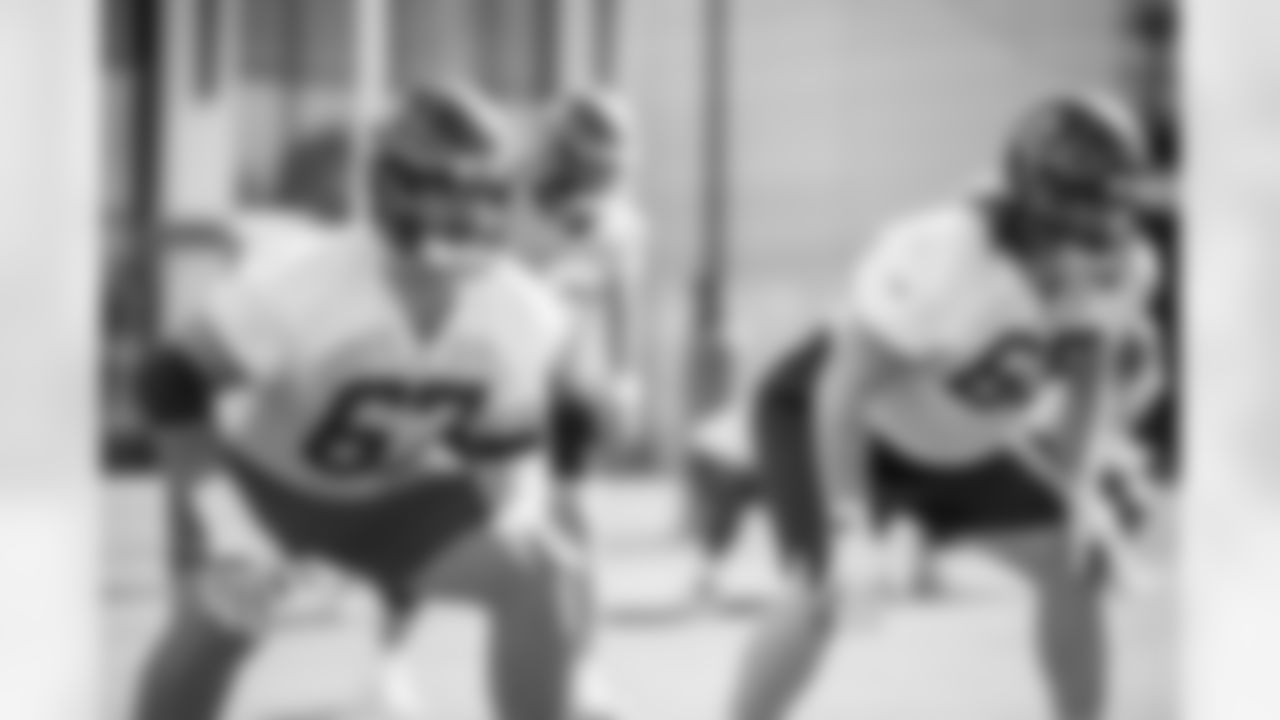
TAMPA, FL - June 13, 2024 - Guard Luke Goedeke #67 and Guard Cody Mauch #69 of the Tampa Bay Buccaneers during 2024 Minicamp at AdventHealth Training Center. Photo By Kyle Zedaker/Tampa Bay Buccaneers

TAMPA, FL - June 13, 2024 - Quarterback Baker Mayfield #6 of the Tampa Bay Buccaneers during 2024 Minicamp at AdventHealth Training Center. Photo By Kyle Zedaker/Tampa Bay Buccaneers

TAMPA, FL - June 13, 2024 - Quarterback Baker Mayfield #6 and Offensive Coordinator Liam Coen of the Tampa Bay Buccaneers during 2024 Minicamp at AdventHealth Training Center. Photo By Kyle Zedaker/Tampa Bay Buccaneers

TAMPA, FL - June 13, 2024 - Quarterback Baker Mayfield #6, Guard Luke Goedeke #67, Guard Cody Mauch #69, and Offensive Lineman Robert Hainsey #70 of the Tampa Bay Buccaneers during 2024 Minicamp at AdventHealth Training Center. Photo By Kyle Zedaker/Tampa Bay Buccaneers

TAMPA, FL - June 13, 2024 - Quarterback Baker Mayfield #6 of the Tampa Bay Buccaneers during 2024 Minicamp at AdventHealth Training Center. Photo By Kyle Zedaker/Tampa Bay Buccaneers

TAMPA, FL - June 13, 2024 - Team huddle during 2024 Minicamp at AdventHealth Training Center. Photo By Kyle Zedaker/Tampa Bay Buccaneers

TAMPA, FL - June 13, 2024 - Cornerback Zyon McCollum #27 of the Tampa Bay Buccaneers during 2024 Minicamp at AdventHealth Training Center. Photo By Kyle Zedaker/Tampa Bay Buccaneers

TAMPA, FL - June 13, 2024 - Quarterback Baker Mayfield #6 and Offensive Lineman Robert Hainsey #70 of the Tampa Bay Buccaneers during 2024 Minicamp at AdventHealth Training Center. Photo By Kyle Zedaker/Tampa Bay Buccaneers

TAMPA, FL - June 13, 2024 - Offensive Lineman Robert Hainsey #70 of the Tampa Bay Buccaneers during 2024 Minicamp at AdventHealth Training Center. Photo By Kyle Zedaker/Tampa Bay Buccaneers

TAMPA, FL - June 13, 2024 - Quarterback Baker Mayfield #6 of the Tampa Bay Buccaneers during 2024 Minicamp at AdventHealth Training Center. Photo By Kyle Zedaker/Tampa Bay Buccaneers

TAMPA, FL - June 13, 2024 - Helmet during 2024 Minicamp at AdventHealth Training Center. Photo By Kyle Zedaker/Tampa Bay Buccaneers
Punt Return/Coverage
The punting process has not changed, so McGaughey knows what he's dealing with as he tries to improve the Bucs' coverage. While Camarda was among the league leaders in gross average, his net punting average of 41.8 was tied for 17th in the NFL and his net yards over average of 0.122 was 19th. In contrast, the four punters above him on the gross average chart all had net yards over average figures ranging between 1.309 and 3.746. These numbers suggest that there are gains to be made in the Bucs' punt coverage unit.
That said, McGaughey has been impressed by what he's seen on the roster since arriving in Tampa and thinks that the assets are there for a good coverage squad. Among his core coverage men are defensive back Josh Hayes, cornerback Zyon McCollum, linebacker K.J. Britt, safety kaevon Merriweather, tight end Ko Kieft and linebacker SirVocea Dennis, all recent draft picks or undrafted signings. The Bucs have also added some rookies to the mix since McGaughey's arrival, and they typically understand that their best path to a roster spot is to carve out a role on special teams.
"To a man, when you look at all these guys, they have some type of really good attributes, [special] teams-wise, whether they be big, strong, fast, quick," said McGaughey. "They all have something. And that's a good thing. That's good for them and it's good for us. So Jason and the guys did a great job of going out and identifying the talent and then picking them, the guys that are going to fit within our program."
Again, the return side of the coin is still up in the air with Thompkins no longer around. Some rookies, such as third-round receiver Jalen McMillan, are likely to get a look. McGaughey needs to see them in action, particularly in games, to discover who has natural return ability.
"Two things – you've got to have really good speed, and you've got to be fearless," he said. "I call it 'running through the smoke.' You've got to run through the smoke. Sometimes you don't know what's on the other side of the smoke, but you've got to run through it, and you've got to hit that gas when you go through. And guys that have really good vision, that second-level vision, that can always make the first guy miss and just seeing beyond to the second level, those are the ones that are special, thave have that really good vision. It's hard to develop that. It's something I think that innately you just develop over time. But those guys that have those types of attributes, those are the ones that have a lot of success.
Placekicking
McGaughey should certainly be confident in this phase of the Bucs' special teams work after Chase McLaughlin turned in the best season by a kicker in franchise history. His nearly flawless work, particularly from long distance, earned him a new multi-year contract this offseason.
McLaughlin only missed twice in 31 field goal attempts during the regular season, and both of those failed kicks were blocked. He didn't miss an unblocked field goal until the postseason, when he went four for five overall. McLaughlin's 93.5% field goal success rate set a new single-season record for the Buccaneers and was particularly impressive because Todd Bowles wasn't shy about sending him out for very long attempts. McLaughlin tried eight field goals from 50 yards beyond and made seven of them, including three shots from 57 yards out and two more from 55. This was not a fluke; McLaughlin is now an incredible 24 of 29 from 50-plus yards in his career.
"It's huge to be able to have a guy that you know is dependable, and that's a pro that comes in every day and he knows exactly what he wants to do and how he wants to do it, a guy that's been around the block a few times," said McGaughey. "He's had a couple different jerseys, so he understands what it's like to be at home sitting on the coach and not have a job. And then you learn to appreciate it a little bit more, and then when you get these opportunities you take full advantage of them, like he has, being 93% last year."
It helped that the Bucs had a well-oiled field goal operation, with veteran Zach Triner handling the snaps and Camarda working as the holder. Triner will have competition to retain his job in 2024, however, as the Buccaneers are bringing former Duke long-snapper Evan Deckers to training camp for the second year in a row. McGaughey says the competition is real and both snappers have been working well together.
"It's just one of those deals where you've got an older guy and a younger guy and that compete for a spot," he said. "Competition's good for everybody."
















